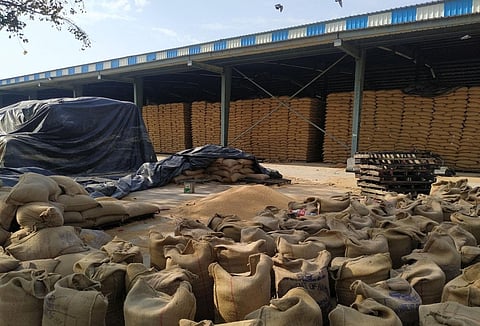
- Home
- Live Blog
- Breaking News
- Top Headlines
- Cities
- NE News
- Sentinel Media
- Sports
- Education
- Jobs

NEW DELHI: While India’s foodgrain production surged to a record high of 353.96 million tonnes in 2024-25, the country has also expanded its storage capacity with the aim to reduce post-harvest wastage and link farms to markets while empowering farmers to realise better returns. The Food Corporation of India (FCI) and State agencies currently hold 917.83 lakh metric tonnes of covered and CAP storage capacity for central pool grains, while there are 8,815 cold storages with 40.21 million metric tonnes capacity to preserve perishables nationwide, according to an official statement issued on Sunday.
Additionally, decentralised storage is also expanding with 5,937 new primary Agricultural Credit Societies (PACS) having been registered and 73,492 computerised as of June. To further improve PACS functioning, the government has approved a project to computerise operational PACS with a financial outlay of Rs 2,516 crore, enhancing transparency, record-keeping, and efficiency, the statement said. Effective storage infrastructure is vital for managing India's food supply chain, reducing wastage, and ensuring both farmer and consumer welfare. Proper storage, including cold storage and modern warehouses, significantly reduces the wastage of agricultural produce.
The help in maintaining a buffer stock of foodgrain, which is essential for national food security and for distribution under programmes like the National Food Security Act (NFSA). The buffer stock also helps to protect consumers from extreme price volatility in essential commodities, as the government can release foodgrain in the market to increase supply and bring down prices when required. Government schemes like the Agriculture Infrastructure Fund (AIF), Agricultural Marketing Infrastructure (AMI), Pradhan Mantri Kisan SAMPADA Yojana (PMKSY), and World’s Largest Grain Storage Plan are strengthening storage, processing, and farmer income security. The Agriculture Infrastructure Fund (AIF) was launched in 2020 to strengthen agricultural infrastructure across India. It is a medium-long-term debt financing facility through interest subvention and credit guarantee support on loans for investment in viable projects for post-harvest management infrastructure and viable farming assets. The scheme focuses on the creation of farm-gate storage and logistics facilities to help farmers store their produce effectively and sell it at better prices by minimising post-harvest losses and reducing dependence on intermediaries. Infrastructure such as warehouses, cold storage, sorting and grading units, and ripening chambers enhances farmers’ ability to access wider markets and improve value realisation, thereby boosting their income. As on September, Rs 73,155 crore have been sanctioned for 1.27 lakh projects under AIF, including thousands of warehouses and cold stores. (IANS)
Also Read: NSE registered investor base crosses 12 crore (120 million) unique investors (unique PANs)
Also Watch: